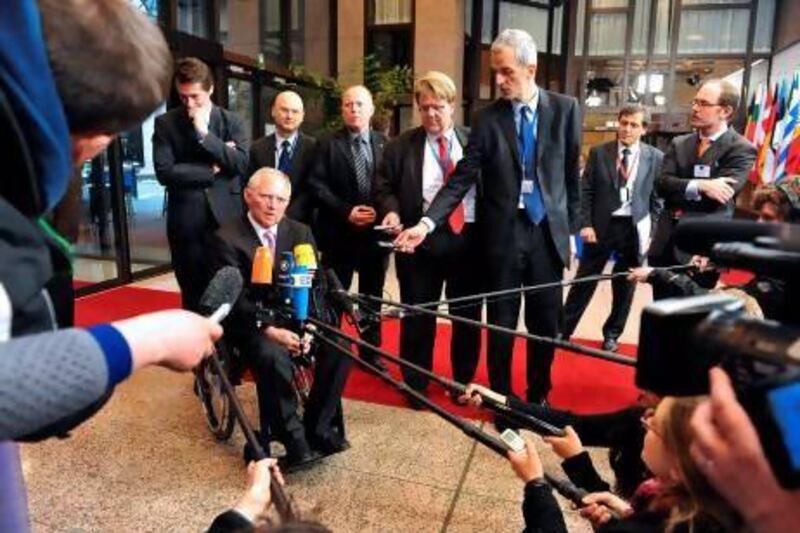BRUSSELS // Cypriot politicians turned to the European Union yesterday in a last-ditch effort to help their island nation forge a viable plan to secure an international bailout after failing for a week to find a solution to a crisis that could force their country into bankruptcy.
Politicians were under pressure to come up with a solution quickly. The European Central Bank has threatened to stop providing emergency funding to Cyprus' banks after today if there is no agreement on a way to raise €5.8 billion euros (Dh27bn) needed to get a €10 billion euro rescue loan package from the International Monetary Fund and the other European countries that use the euro currency.
If Cyprus fails to secure a bailout, some of its banks could collapse within days, rapidly dragging down the government and possibly forcing the country of around 1 million out of the eurozone. Analysts say that could threaten the stability of the currency used by more than 300 million people in 17 EU nations.
Despite that risk, Europe's biggest economy maintained a hard line on the negotiations. German finance minister Wolfgang Schaeuble said in an interview "if possible we want to avoid seeing Cyprus sliding into insolvency." But he cautioned that he is "known for not giving in to blackmail, by nobody and nothing."
Heading into a decisive meeting of eurozone finance ministers on the issue in Brussels, Mr Schaeuble said an agreement can be reached if Cyprus meets creditors' demands.
"I hope we can get to a result today. But that of course requires that the situation is viewed realistically in Cyprus," he said. "This is not about us - the decision lies with Cyprus."
Cypriot president Nicos Anastasiades and his finance minister were meeting with representatives of the troika of international creditors- the International Monetary Fund, the European Central Bank, and the European Commission, the EU's executive arm, to work out final details, officials said.
The meeting dragged on, and the start of the meeting of eurozone finance ministers was postponed by two hours.
"I'm expecting quite a long night," Irish finance minister Michael Noonan said late yesterday. "I think a deal will be done tonight but I think it will be late, because a lot of detail has to be worked out."
A plan agreed to in marathon negotiations earlier this month called for a one-time levy on all bank depositors in Cypriot banks. But the proposal ignited fierce anger among Cypriots and failed to garner a single vote in the Cypriot parliament.
The idea of some sort of deposit grab has returned to the fore after Cyprus' attempt to gain Russian financial aid failed this past week, with deposits above €100,000 at the country's troubled largest lender, Bank of Cyprus, possibly facing a levy of up to 25 per cent.
To avoid bankruptcy or the collapse of its banking system, Cyprus needs significantly more than the €10 billion international creditors are willing to lend it. There's fear that more loans would raise the country's debt to an unsustainable level. For that reason, the country has been told it must raise the additional money.
Officials fear that a Cypriot bankruptcy, which would likely force the country to become the first eurozone member to leave the currency bloc, would roil markets and result in uncertainty that could engulf other eurozone nations, leading to capital flight and higher government borrowing costs.
If the Cypriots agree to a plan, the IMF, European Central Bank and European Commission will then determine whether it meets the requirement that Cyprus' debt, including any new bailout loan, be sustainable over the long run. Any new proposal would then have to be approved by the Eurogroup - the finance ministers from the 17 EU countries that use the euro.
Their decision might come only as a broad political agreement, with technical details to be hammered out in the coming days. But without an agreement in principle, the ECB is likely to pull the plug on Cyprus' banking system.






